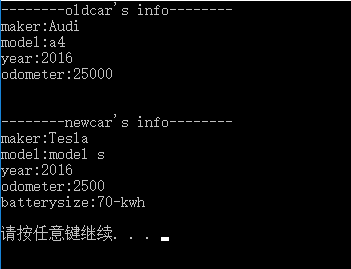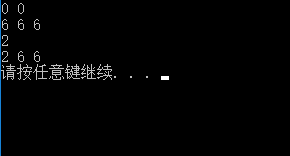实验四
实验结论:
(1)

#ifndef BATTERY_H #define BATTERY_H class Battery { public: Battery(int x=70); int showbattery(); int batterySize; }; #endif

#ifndef CAR_H #define CAR_H #include <string> #include <iostream> using namespace std; class Car { public: Car(string x, string y, int a, int b = 0); friend ostream&operator<<(ostream &out, Car &a); void updateOdometer(int x); string maker, model; int year, odometer; }; #endif

#ifndef ELECTRICCAR_H #define ELECTRICCAR_H #include "battery.h" #include "car.h" class ElectricCar :public Car, public Battery { public: ElectricCar(string x, string y, int a, int b = 0,int c=70); friend ostream&operator<<(ostream &out, ElectricCar &a); private: Battery battery; }; #endif

#include "battery.h" Battery::Battery(int x):batterySize(x) { } int Battery::showbattery() { return batterySize; }

#include <iostream> using namespace std; #include <string> #include "car.h" Car::Car(string x, string y, int a, int b ) :maker(x), model(y), year(a), odometer(b) { } ostream &operator<<(ostream &out, Car &a) { out << "maker:" << a.maker << endl << "model:" << a.model << endl << "year:" << a.year << endl << "odometer:" << a.odometer << endl; return out; } void Car::updateOdometer(int x) { if ( x < odometer) cout << "the new odometer is wrong!" << endl; else odometer = x; odometer = x; }

#include "electricCar.h" #include "car.h" #include "battery.h" #include <iostream> using namespace std; ElectricCar::ElectricCar(string x, string y, int a, int b, int c) :Car(x, y, a, b),Battery(c){ } ostream &operator<<(ostream &out, ElectricCar &a) { out << "maker:" << a.maker << endl << "model:" << a.model << endl << "year:" << a.year << endl << "odometer:" << a.odometer << endl << "batterysize:" << a.batterySize <<"-kwh"<< endl; return out; }

#include <iostream> using namespace std; #include "car.h" #include "electricCar.h" int main() { // 测试Car类 Car oldcar("Audi","a4",2016); cout << "--------oldcar's info--------" << endl; oldcar.updateOdometer(25000); cout << oldcar << endl; // 测试ElectricCar类 ElectricCar newcar("Tesla","model s",2016); newcar.updateOdometer(2500); cout << "\n--------newcar's info--------\n"; cout << newcar << endl; system("pause"); return 0; }
运行截图:

(2)

#ifndef ARRAY_INT_H #define ARRAY_INT_H class ArrayInt{ public: ArrayInt(int n, int value=0); ~ArrayInt(); int &operator[](int x); void print(); private: int *p; int size; }; #endif

#include "arrayInt.h" #include <iostream> #include <cstdlib> using std::cout; using std::endl; ArrayInt::ArrayInt(int n, int value): size(n) { p = new int[size]; if (p == nullptr) { cout << "fail to mallocate memory" << endl; exit(0); } for(int i=0; i<size; i++) p[i] = value; } ArrayInt::~ArrayInt() { delete[] p; } void ArrayInt::print() { for(int i=0; i<size; i++) cout << p[i] << " "; cout << endl; } int& ArrayInt:: operator[](int x) { return p[x]; }

#include <iostream> using namespace std; #include "arrayInt.h" int main() { // 定义动态整型数组对象a,包含2个元素,初始值为0 ArrayInt a(2); a.print(); // 定义动态整型数组对象b,包含3个元素,初始值为6 ArrayInt b(3, 6); b.print(); // 通过对象名和下标方式访问并修改对象元素 b[0] = 2; cout << b[0] << endl; b.print(); system("pause"); return 0; }
运行截图:

实验总结与体验:
1、了解[ ],<<运算符的重载方式,知道不同的地址访问方式
2、类的派生与继承,编程过程中纠正很多细节性错误,头文件类后的分号,参数传递,初始化方式。




